Can dogs eat apples? Well, you know what they say, an apple a day keeps the doctor away. Or, in this case, the veterinarian. Apples are packed with nutrition that keeps your dog healthy and happy. So yes, dogs can most definitely eat apples!
With that said, you still shouldn't allow your pup to dive in the apple barrel mouth first. Nothing can replace the nutrition that your dog gets from his diet of nutritious dog food.
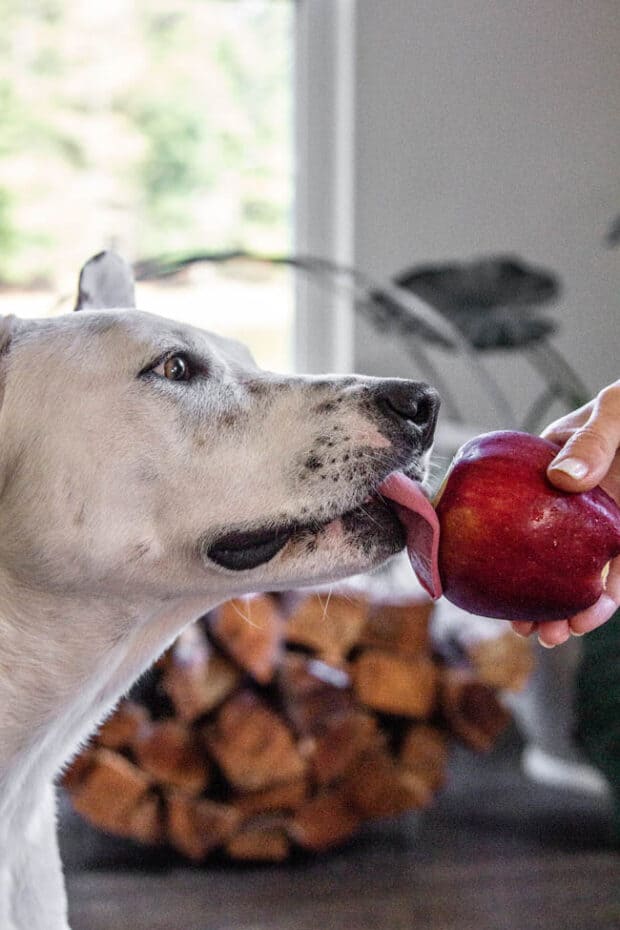
Apples should be used as supplemental snacks instead of complete meal replacements. It helps to remember the 90/10 rule if you're unsure of the dog food to treat ration. This rule means that 90% of your dog's daily calorie intake should come from dog food; the extra 10% can come from treats.
So next time you're munching on an apple, and you're getting those irresistible puppy dog eyes, toss a few chunks that way. They will love it, and you can be confident that it's not only safe but also incredibly nutritious. After all, what is better than sharing a snack with your best friend?
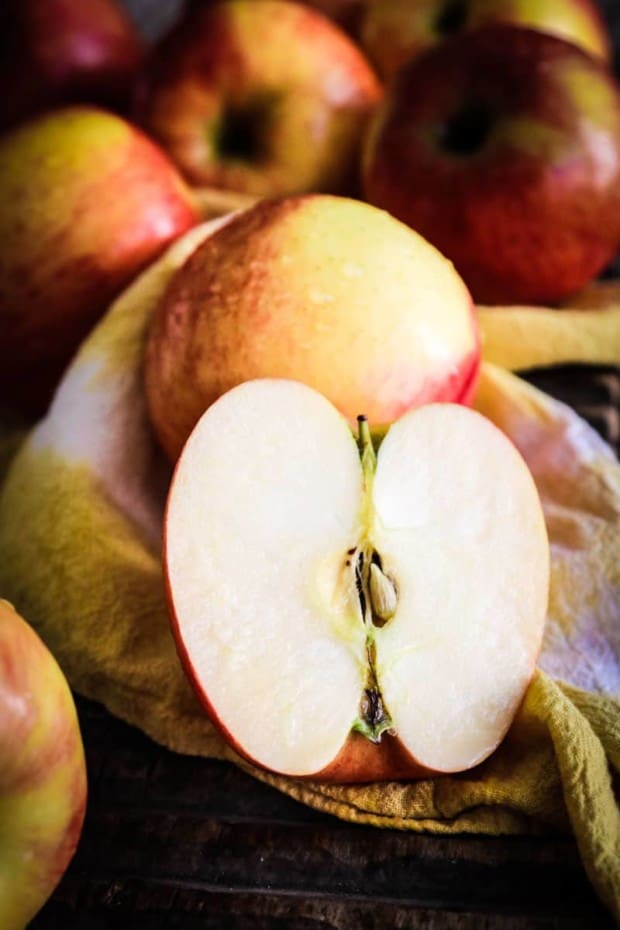
Are apples a healthy treat that dogs can eat?
A healthy dog is a happy dog. And as dog lovers, that is the ultimate goal. We rely on our pups for entertainment, unconditional love, and a lifelong friendship. They depend on us to keep them healthy and fit.
Giving them nutritious treats is a great way to keep those tails wagging. The benefits that they get from the prolific amount of nutrients in apples are virtually incalculable.
Low in protein and calories, apples provide all their health benefits without filling up your dog's tummy, leaving plenty of room for the regular diet of healthy food that is so important in developing dogs' bodies.
Our dogs are treated to an apple a day very first thing in the morning. We simply remove the core and seeds, chop them into bite-sized pieces, and serve them in the dog's bowls. They get their daily apple fix while we sip coffee, it's a beautiful thing and they LOVE it!
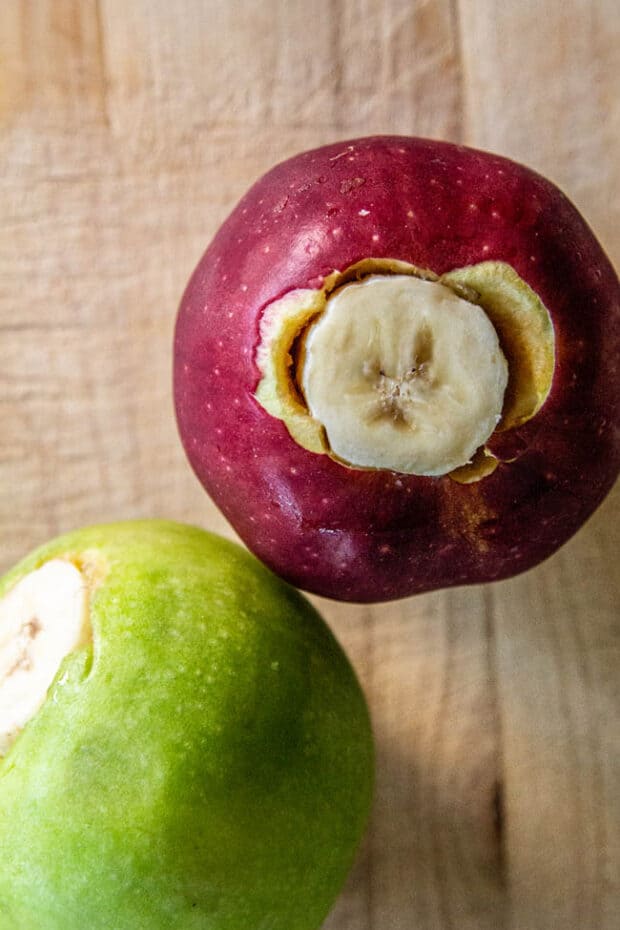
The following is a list of the main nutritional components in apples and how they keep dogs healthy:
Calcium
Just like for us, calcium is an essential mineral that maintains dogs' bone and tooth health. Most commercial dog foods include the proper daily amount for your dog, but adding healthy fruits and vegetables full of calcium to his diet is never a bad thing.
Along with benefits to bone health, calcium provides strength to muscles necessary for proper movement and body functions. It allows for average growth in puppies and keeps them healthy and active as they get older.
If you have a pregnant or lactating dog, it becomes even more critical to make sure that there is plenty of calcium in your dog's diet.
Fiber
High-quality, plant-based dietary fiber should always be at the top of your dog's nutritional needs list. It efficiently aids the digestive system in breaking down foods and mitigating the growth of harmful gut bacteria. In addition, healthy fiber treats both constipation and diarrhea.
Fiber is also essential in the weight control of dogs. As obesity is the leading cause of all canine illnesses, this is key to providing long and healthy life. Adding more fiber to the diet will cause your dog to get full quicker, even while eating fewer calories.
Polyphenols
Polyphenols are a lesser-known but equally important component of the overall nutrition in apples. Only found in fruits and vegetables, polyphenols are the kings of antioxidants.
Their job is to locate and destroy the disease-causing free radicals that roam around the body. Excessive amounts of free radicals can quickly cause health issues in your dog, just like in a human body.
Dogs, even more so than humans, are vulnerable to dangerous toxins that antioxidants can only remove. Just think of all the things that your dog licks, chews, and eats. Everything from household cleaners to chemically treated lawns can turn your dog's body into a minefield of free radicals.
Antioxidants like polyphenols are significant factors for reducing the risk of cancer and heart and bone disease, among other things. As your dog gets older, a solid diet that includes polyphenols becomes even more critical.
Potassium
Potassium maintains a necessary balance of fluid in the body, enhancing the muscular system by guaranteeing healthy muscle growth and function. The effects include increased motor skills, regular heartbeats, and increased blood flow.
Additionally, it increases metabolism, bone density, and cognitive functions. Potassium is a must for any healthy dog's diet.
Vitamin A
Like your mom always told you, Vitamin A is responsible for good vision and proper eye health. You've probably noticed that the diminution of sight is a common symptom in many elder dogs. So it is imperative to make sure your aging pups get all the Vitamin A they need.
But eye health isn't the only positive that the body gets from Vitamin A. It also promotes average growth and development, boosts the immune system, and increases cellular function.
Vitamin C
Vitamin C's antioxidant and anti-inflammatory properties, working with polyphenols, are well known and rightfully praised. It boosts the immune system, reduces cognitive decline in elder dogs, and rids the body of cancer-causing free radicals.
While dogs' bodies produce a supply of Vitamin C, physical and emotional stress can reduce the growth rate and amount of reserve. So if you notice symptoms of anxiety in your dog (skin issues are a significant cause), make sure that he is getting plenty of Vitamin C.
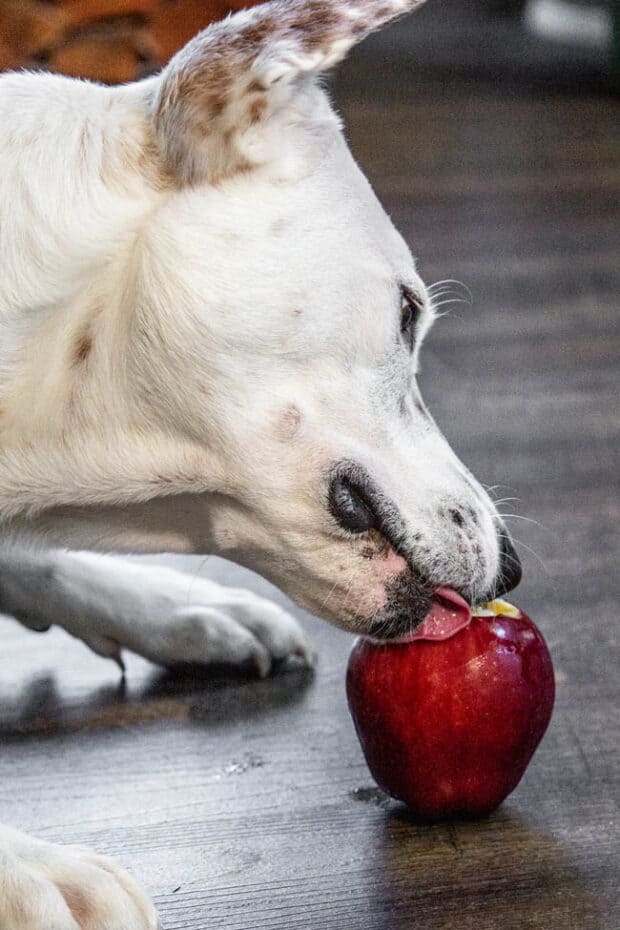
Can dogs eat apples with skin?
Dogs can eat apples with the skin still attached. It provides additional benefits for dogs and shouldn't cause any digestive problems.
Of course, you should always wash unpeeled fruit before feeding it to dogs, just as we do for ourselves. Toxins can be especially harmful to the more petite body of a canine.

Can there be risks associated when your dogs eat apples?
We've established a long list of positive nutritional aspects of apples. Now, let's talk about some possible negative issues that could occur when your dog eats apples.
Overindulgence - dogs can eat too many apples in one sitting
Like most fruits, apples contain natural sugars and starch, negatively affecting dogs way quicker than humans. In addition, after overindulging in apples, dogs have a tendency for an upset stomach, often followed by diarrhea.
Moderation is the key to maximizing the benefits of apples. Most smaller dogs should be limited to a few slices per day; larger breeds can handle more than that. Just be aware when you feed your dog apples to treat them as snacks rather than meals.
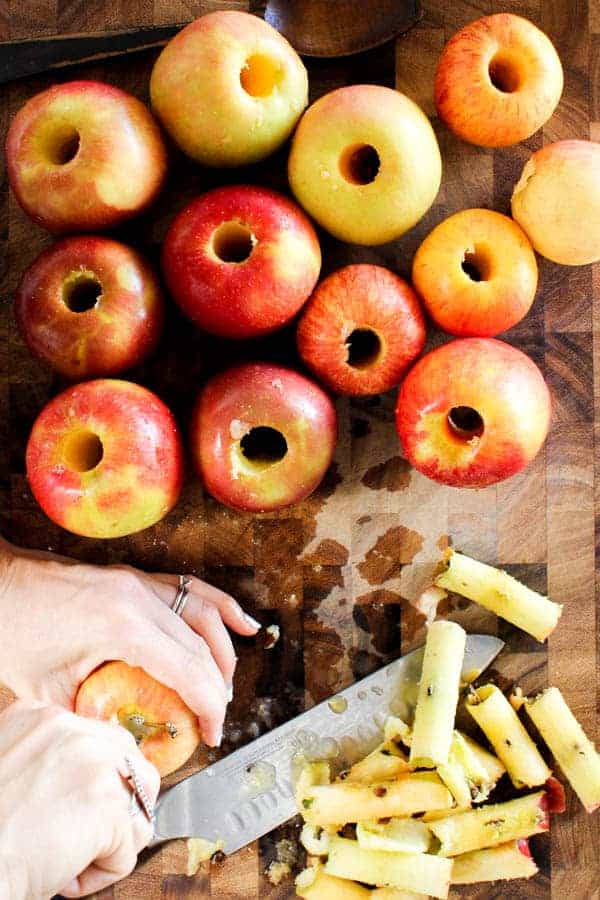
Seeds and Core
Apple seeds and cores should be avoided at all costs. Cores are choking hazards for dogs because of their hardness and size. They can also get lodged in the intestines, creating a messy situation for all involved.
The seeds contain harmful toxins, such as cyanide, that should never be chewed or ingested. A random seed or two won't do significant harm, but eating a couple of whole apples with seeds can negatively impact a dog's body.
Cutting apples into slices or chunks is the best way to go before feeding them to your dog. Just be sure to discard the core and seeds where they can't be sniffed out.
Allergies
Though very rare, dogs can have allergic reactions to apples. When first giving apples to your dog, be on the lookout for signs of allergies, including coughing, sneezing, itching, and breathing trouble.
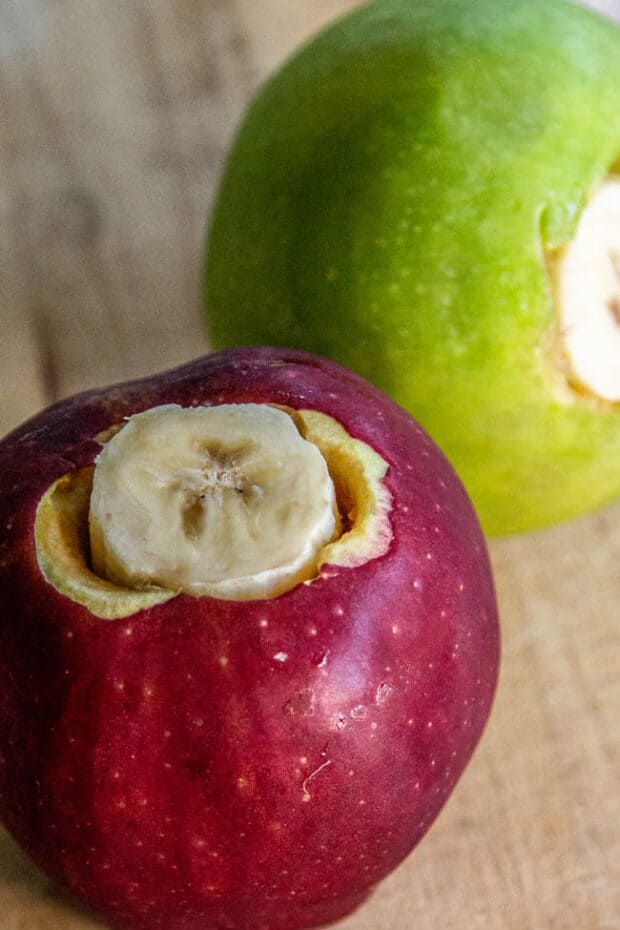
Recipes with apples your dog can eat!
If your dogs are like mine, they'll eat fruits like apples anytime, anywhere, and anyway you can think to give it to them. Some dogs, like our Rebel, will immediately devour apples without giving it a second thought. Others may need a bit more coercion to realize that they like apples too!
For very small dogs or picky eaters - Start small! Try adding a little shredded apple into their food. Sometimes new flavors and textures can be overwhelming for people and our dogs are the same. Our oldest dog wouldn't touch an apple a year ago and now he looks forward to eating an entire apple each morning just diced into his bowl but it started with shredded apple first.
Try it sauced - A little unsweetened apple sauce is a wonderful treat for you and your dog! I like to just omit the pumpkin and add a spoonful or two to our dog's protein-packed yogurt bowls on occasion. They love it!! If you have a small dog or a dog with sensitive teeth this would be a great option too.
We treat with apples in all sorts of ways over here, but this next suggestion is our dog Rebel's favorite! You see, Rebel is a chewer - it's all that pit bull in her DNA! She gets bored easily too...which can lead to destructive chewing behaviors.
DIY Apple Kong For Dogs - Oh yes, I am 100% serious! This is Rebel's favorite treat and they take her just about FOREVER to get through them. We freeze this apple kong for dogs and offer them to her when she is bored or we just need to keep her attention held for a few minutes. She literally dances when she sees them.
The halved banana just slips right down into where the core and seeds were, so it isn't a hard-to-make treat either. As it melts the banana transforms into the consistency of ice cream - creating a lickable melty center to this frozen treat that literally drives her bananas!
If you’ve made our DIY Apple Kong for dogs recipe or started feeding your dog's apples I would love to hear about it! I'd be so grateful if you would rate the recipe and let me know what you think in the comments below!
PrintDIY Apple Kong for Dogs
This 2-ingredient no-cook dog treat is a BIG hit with our dogs and keeps them entertained for quite some too!
- Prep Time: 5 min
- Total Time: 5 minutes
- Yield: 2 treats for a large dog 1x
- Category: Dog food
- Method: Frozen
- Cuisine: Dog Treats
Ingredients
2 apples, any variety
1 banana, halved through the middle, and peeled
Instructions
Remove the seeds and core from the apples. Make the hole in the apple just wide enough that the banana can fit snuggly inside.
Fit half the banana into the apple where the seeds and core previously were.
Freeze for 6-8 hours until frozen solid.
Nutrition
- Serving Size: 1 apple
- Calories: 147
- Sugar: 26.1 g
- Sodium: 2.4 mg
- Fat: 0.5 g
- Carbohydrates: 38.6 g
- Protein: 1.1 g
- Cholesterol: 0 mg
Interested in making homemade treats for your dog? We have lots of recipes to choose from!

Frozen Blueberry Yogurt Dog Treats
Can dogs eat blueberries? Blueberries are one of the best fruits that dogs can eat. This flavorful little superfood packs quite a nutritious punch loaded with vitamins, minerals, and other nutrients.
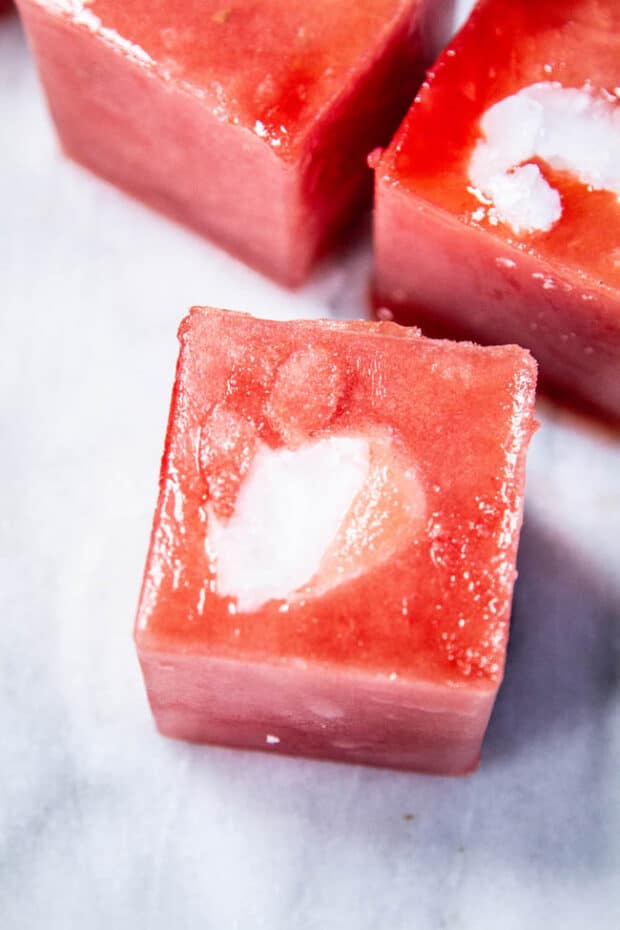
Frozen Watermelon & Coconut Oil Dog Treats
Can dogs eat watermelon? Of course! There are few treats that dogs enjoy better than a sweet, cold chunk of summer melon.
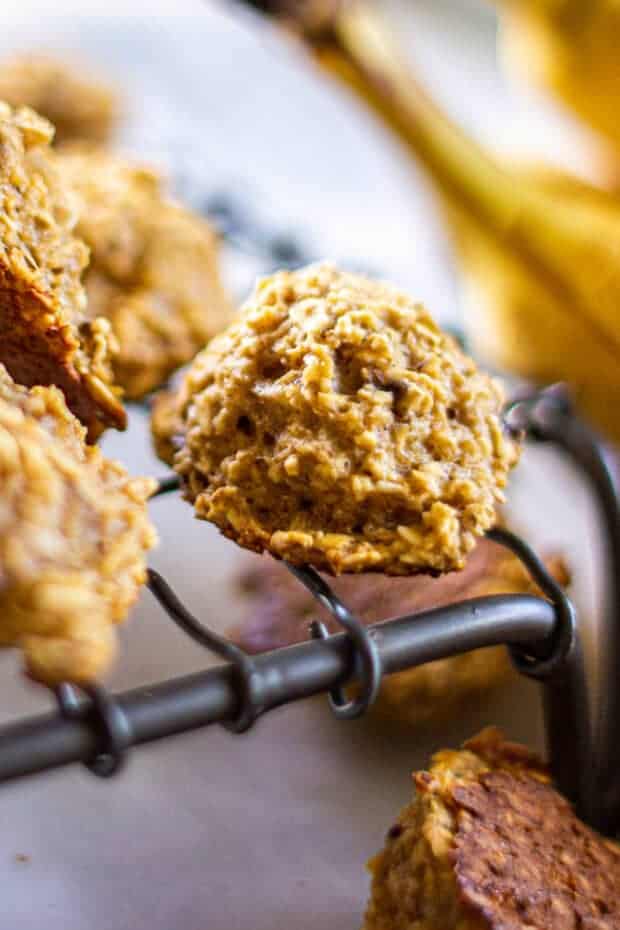
Easy Banana Bread Dog Treats
Can Dogs Eat Bananas? That is a resounding YES!
Don't be hoarding all the banana bread baked goods for yourself - these 3-ingredient baked dog treats are easy to make and taste scrumptious! Even to us humans.

Dehydrated Sweet Potato Dog Treats
Can Dogs Eat Sweet Potatoes? The answer is YES!
This 1-ingredient dog treat recipe is great for your dog and will save you lots of money by making them at home!

Baked Peanut Butter Dog Treat
This easy Peanut Butter Dog Treat recipe requires only 10 minutes of hands-on time and only 4 ingredients! This is bound to be your dog's new favorite treat! This dog treat recipe is simple to make, gluten-free, and full of good for your dog ingredients.


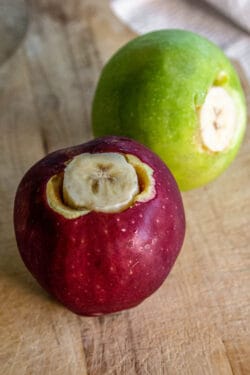
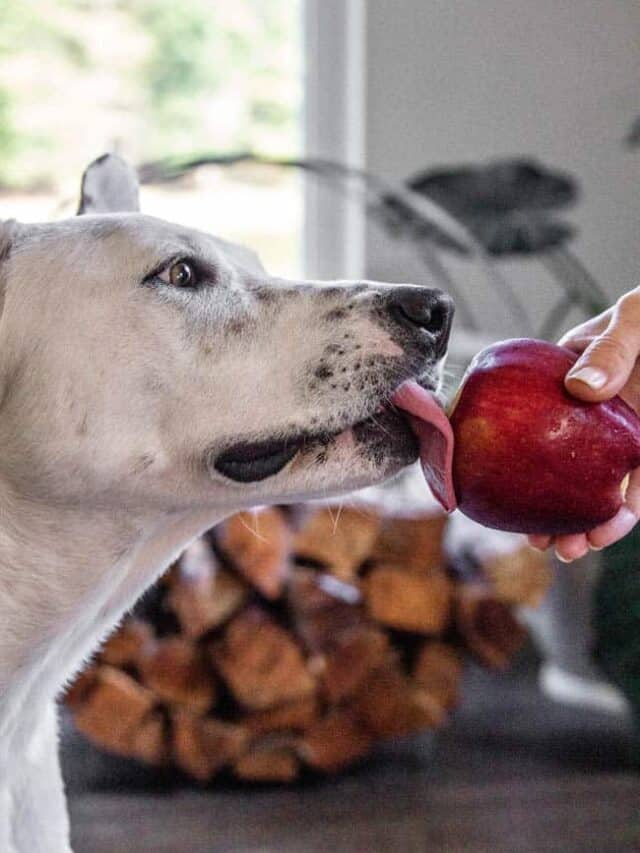
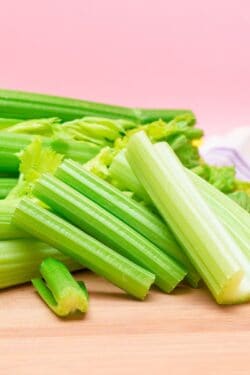
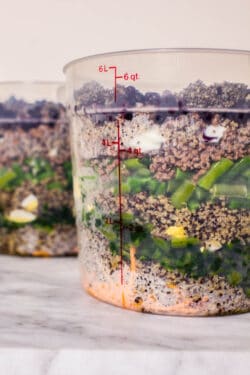

Doug and Pam Cason says
I am new to the site, but your dog recipes are easy to follow and I love the information you’ve provided. My Precious Princess (American Bully) has allergies. We are trying to see what type of allergies because it’s costing us a fortune at the veterinary. It’s running $200-$500 a month. We have changed her dog food 6 times. I am trying your recipe, in place of chicken we are adding fish, with rice, egg, and carrots. If she likes it we will let you know. Wish us luck. Thank you
meg@thismessisours says
Good luck!! Let me know how everything works out for your sweet pup.
jarma says
VERY GOOD !!!!!